The Phantom Fellows review
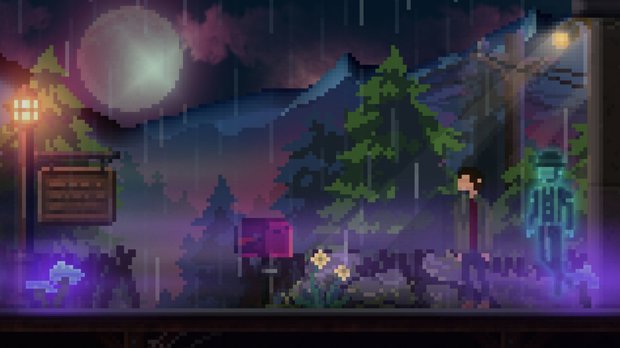
- 7 Comments
Careful you don’t die laughing at this hilariously quirky retro-modern supernatural buddy adventure
At first blush, The Phantom Fellows sounds a lot like the illegitimate lovechild of The Darkside Detective and Wadjet Eye's Blackwell games, marrying the snarky banter and linked supernatural cases of one with the trapped ghosts and spirit guide of the other. But while, yes, it does have all of those things (solo developer Paul Korman is clearly a fan of both series), the game sets out from there in new and vibrantly eccentric directions. Cleverly balancing humour and heart over the course of its increasingly involved cases, its dialogue plays with language like an innuendo-obsessed P.G. Wodehouse while its varied puzzles are as logical as they are comic in their consequences. At times you'll need eagle eyes and some persistence to make it through, and the interface is not without its quirks, but even with a few rough edges it's still a hilariously original experience.
Oliver and Englebert are an odd couple. For one thing, Oliver is a breather, while Englebert is a floater, which is another way of saying that Oliver is a real live human while Englebert has, well, passed on. Except he hasn't actually gone anywhere and instead whiles away his time haunting – or more accurately, pranking – people. He's been at this for a while, as his bowler hat and mutton-chop whiskers attest, so it must have come as a bit of a surprise when he realised that young Oliver could see him. And talk to him. All, somehow, without freaking out. Then again, Oliver was a strange child, who's since grown into a strange man. Or man-child, at least.
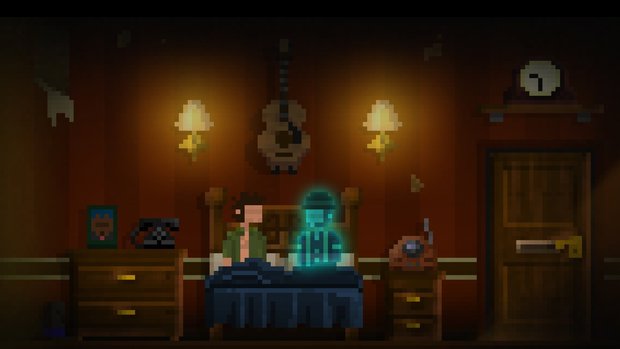
Englebert hankers after the good old days, when things were heavy and solid and you didn't have to deal with all this newfangled technology, like telephones. And electricity. Meanwhile, Oliver hasn't quite mastered the whole having a career and money thing, or getting up during daylight hours, so it was perhaps inevitable that he'd wind up leaning on his spook-seeing powers to set up a ghost-hunting business for haunted clients. Just to be clear, that's spook, singular: Oliver can only see Englebert, who therefore has to do most of the work of interacting with other spirits (and boy, does he ever rub that in). But being able to contact them at all is a big help; sometimes they can be bribed with the offer of better digs elsewhere, sometimes they have one last request, and sometimes... well, let's just say ghosts can have some unique relationship issues.
Fans of The Darkside Detective will feel right at home with the graphics, which similarly use super-chunky pixels to create detailed, realistic scenes. Or at least pack in as much detail as possible given that faces can only take up a handful of pixels, and many objects even less than that. Add in a gentle glow around lights and ghosts, spots of drifting fog and lashing rain here and there, and it's like playing an early 90s game as seen through the rose-tinted glasses of nostalgia. That 90s vibe extends to the world, too, where Oliver drives around his hometown of Elderberry in a battered old station wagon, stumbling across floppy disks and VHS tapes. One moment he and Englebert are patrolling the museum, and the next they've been called to a haunted bar, with a ghost train, a spooky stable, and (inevitably) a cemetery also on their to-do list. And that's just their more ordinary hangouts!
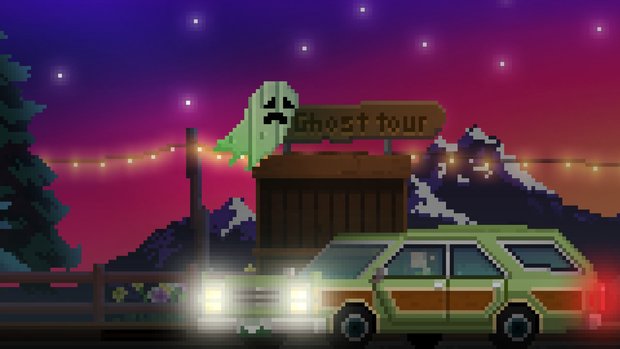
The music also leans into the retro aesthetic, mixing synthwave with the occasional spot of guitar-led rock. These tracks are used for emphasis, and fade out to leave just the background hum of traffic or whisper of wind as you explore. This keeps things fresh and avoids the distraction of endlessly looping background tracks, but it does occasionally leave scenes completely silent, which is a little disconcerting. Especially since there's no voice acting, with dialogue instead popping up in boxes at the top of the screen. (To be fair, Oliver and Englebert are very chatty, so including voices would have been a big ask for a solo developer.)
Speaking of the dialogue, Oliver, in particular, has a... unique take on just about everything. It's as if he's been brought up all alone in a remote bunker, without anyone to explain about things or people but doing his best to make sense of the world anyway. Where you or I see a mere gas can, he sees a jug of car juice full of dinosaur tears that make engines go boom. Lipsticks are mouth crayons, mops are water brooms and frying pans are spare helmets. He's also endlessly curious, as likely to engage Engelbert in a discussion about sock suspenders or the invention of the door handle as he is to talk about their current case. And he loves to show off his eclectic knowledge, even the bits he misheard or has just made up. It's by turns startling and adorable, and Englebert oscillates between making fun of him and being paternally protective. And underneath all the sarcasm and snark, it's clear that they do care about each other. I mean, Oliver coats his door in molasses just so it'll taste better when Englebert floats through it, which is simultaneously gross and sweet. In both senses of the word. On that note, those of a sensitive disposition should be aware that Oliver also revels in innuendo, never missing an opportunity to bring events to a throbbing climax rather than merely an end.
The interface is both familiar and more than a little idiosyncratic. It looks like a typical point-and-click system, with an inventory and options to walk, talk, interact and use items. But then you realise that there are no hotspots. Or rather, that everything is an unlabeled hotspot: click anywhere and you'll get some kind of response. Granted, you'll sometimes draw a blank or get a generic remark, but more often than not clicking on even random objects starts Oliver and Englebert off on a hilarious tangent about different words for "Moon" or which streetlamp is the best for basking under. An icon attached to the cursor shows what will happen when you left-click, and you can cycle between different options by either right-clicking, using a drop-down menu at the top of the screen or with a keyboard shortcut. The one downside of this approach is that it can be tricky to spot useful items, especially given that several of them are just a handful of (admittedly huge) pixels against complex backgrounds. For example, a small off-white strip on the floor could be the handle to a trap-door, a ninja sword, a book, or nothing at all.
You play as both Oliver and Englebert, switching between them as needed so that (for example) Oliver can use an item or Englebert can talk to a spirit. You can either point and click to move through the side-scrolling environments, or control the current character directly. Except, rather than holding down a button to walk from side to side, you have to tap once to start walking and tap again to stop. It feels like something Oliver would have designed: fine once you get used to it, but decidedly non-standard. Awkwardly, although both fellows go from scene to scene as a pair, the one you're not in charge of will just hang out where you left him until needed, making for a bit of a stage wait at times as he walks or floats over.
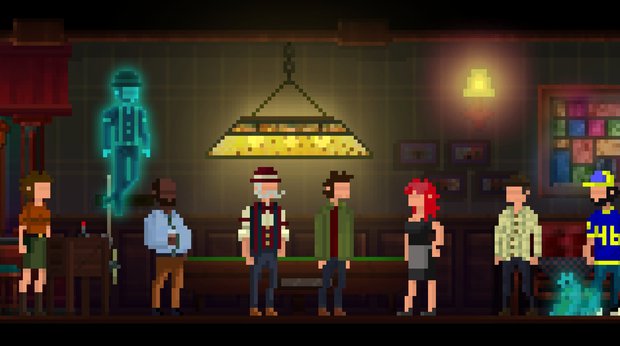
The story unfolds over the course of a week (and about 10-12 hours of gameplay). Each day brings a fresh case, starting with a simple haunted basement and graduating to a convoluted Agatha Christie-esque mystery on a ghost train. You'll also have to navigate the horrors of the Sort Of, an alternate dimension with weird physics and talking toadstools. Naturally, not everything is as it appears and there is more going on under the surface (literally and figuratively), leading to a startling late twist and a cliffhanger ending. Interestingly, although you can tackle these as a series of standalone cases, you can also hop in your car at any time and travel back to the sites of your previous adventures. As well as opening up alternate puzzle solutions, this also lets you check in and see how people are handling their new ghost-free lives, not to mention track down all manner of Easter eggs. There are even secrets to be found in a diner that you otherwise only visit during a cutscene!
For all the amusing antics, the puzzles are surprisingly fair and logical. Or at least, they have their own wacky logic. You'll have to lure in an errant pair of ghost legs with a tasty treat, channel your inner Indiana Jones into hidden catacombs, and trick a horse with a scarecrow cowboy, not to mention figure out the frequency of the universe (no, really). If you get stuck, Englebert will often help out with a handy hint, or just discuss the case with you and hopefully jog your memory. Most of the time this works well, and he does a good job of dropping heavier and heavier hints until he pretty much walks you through the solution. Unfortunately, one thing he won't usually do is guide you to items you've missed, or tell you what to do next if you don't at least know there's something you need to do. (And, frustratingly, a couple of tasks only open up once you've spotted things you aren't particularly looking for.) As a result, I spent rather longer than I'd have liked wandering around clicking everywhere in the hope that something would pop up. Importantly, though, once you've found everything you need, it's generally not too hard to figure out what to do with it all.
Ultimately, the puzzles (as entertaining as they are) take second place to the story and the characters, as that's where The Phantom Fellows really shines. For example, at one point, you're called to a bar that may be haunted by the owner's recently deceased squirrel, Ruckus. To regulars the proprietor is Micky, to acquaintances he's Michael, but to you he's Forrest because you haven't earned his trust yet. That's all easy to play for laughs, but in amongst all the absurdity there's a sense of genuine grief and loss as he tells you how he and Ruckus would sit by the bar after closing time and watch the sunset together. Such moments keep everything grounded, rounding out the surreal and self-consciously weird into something more relatable, treading a fine line between comedy hi-jinks and the melancholy of the Blackwell series. Later cases also come with detailed backstories, from the magicians who made a pact with the Sort Of to the dodgy businessman escaping on the train with a light-fingered gentleman thief. Their methods may be very different, but when Oliver and Englebert close a case, just like Rosa and Joey before them, the moment feels earned.
Final Verdict
The Phantom Fellows is a study in contradictions. The graphics are chunky but detailed, the characters gratuitously odd but warmly relatable, and the dialogue cutely eccentric but laden with puns and innuendo. It's perhaps a bit too original for its own good in places, leading to a curious interface and an over-reliance on pixel hunting, but it's hard not to be charmed and intrigued by its offbeat and carefully realised world, packed as it is with new and left-field takes on the everyday. If you're looking for a refreshing change of perspective or just want to hang out and laugh with some interesting people for a dozen or so hours with the promise of more to come, give the Phantom Fellows a call.
Hot take
The Phantom Fellows marches to the beat of its own ghostly drum. Its zany yet fair puzzles may require a little too much pixel hunting, but it grounds its surreal world in quirkily relatable stories packed with wildly creative dialogue and comically empathetic characters.
Pros
- Chunkily beautiful pixel art and atmospheric synthwave soundtrack
- Eccentric yet engaging characters
- Sparklingly inventive dialogue, by turns charming and a little gross
- Odd but detailed and absorbing cases
- Fair and logical puzzles, often with multiple solutions
Cons
- Quite a bit of pixel hunting, with no hotspots to help
- Interface takes some getting used to
- Hint system won’t help you with missing objects or puzzles you haven’t spotted yet
Peter played The Phantom Fellows on PC using a review code provided by the game's publisher.

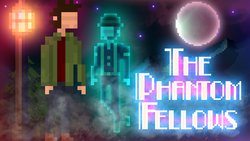

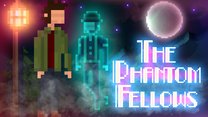

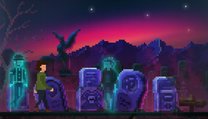
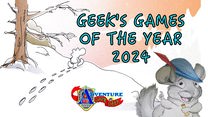

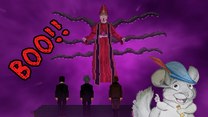
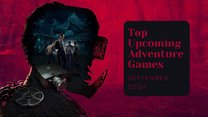
7 Comments
Want to join the discussion? Leave a comment as guest, sign in or register in our forums.
Great that You reviewed it, because on Steam it seems the game is flying below radar so much that it only has 3 reviews right now. Hope more people will notice.
Reply
Really wondering what the adventure game community will think of this one...
Reply
I bought this game on release and am playing the 4th day. I was "ho-hum, this is fun, but just pretty good," at first, but the game has grown on me quickly and now I'm thinking that it is excellent and with a wonderfully unique/eccentric personality that so many games are missing. Especially comedy games. This one is not an ode or homage to anything; it is its own game with its own humor, and it's so much better for it. I'll copy and paste my thoughts so far from a post I made on a certain forum for adventure gamers here, where someone asked me to contrast it with Darkside Detective. *** The two games are kind of similar in genre theme and gameplay style. Paranormal mystery solving pals, chapter by chapter gameplay, comedy, sidescrolling. Phantom Fellows is definitely more challenging. It’s been a while since I played Darkside Detective (and I have only played the first of the two games), but I don’t recall anything in Darkside impeding my progress for more than 5 minutes, whereas Phantom has some pretty good head scratchers so far. Part of the challenge is that there’s not much hand holding unless you ask for it, and when you do ask for it the hint system is excellent. So far I’ve only used it to help me with some pixel hunting; the actual puzzles have all been fair if you pay attention to the dialogue. Phantom Fellows is also more ‘adult’. Not in an obnoxious or gratuitous way, but the author writes what he wants to write, there are no concessions to keeping it family friendly. I think Darkside was more PG, Phantom is more PG-13. Where Phantom is gratuitous is with the environmental descriptions and dialogue, which are fantastic. The game begs to be played slowly, with the player taking the time to enjoy the script and the humor. If you slam through the game as a series of puzzles it will be A) much more difficult since many of the puzzles require conversational clues to make sense, and B) average instead of superb. Yeah, this game is really growing on me, thanks to the well-crafted writing. It’s like the developer spent his entire life ‘til this point writing down every dumb-smart/smart-dumb observation, Seinfeldishism, or piece of wordplay or dad joke or stand up comedy bit he thought of, and then massaged them into the script of his game. It works really well. Not *everything* hits, but when you take a thousand swings you are forgiven for only batting .950.
Reply
Excellent. Thanks for sharing
Reply
By the way, I would love for Paul to write up his own review of his game for this site. The guy is self-conscious and self-critical enough that it would make for a very entertaining read.
Reply
Michael, he didn't write a review, but Paul did devote a recent Classic Gamers Guild podcast to talking about the game: https://www.cggpodcast.com/e/from-idea-to-reality-the-making-of-the-phantom-fellows/
Reply
Great review. Looking forward to play the game. Btw. could someone from the admin team update the "Where to buy" section? Because the game is not only on Steam but also on GOG & itch.io.
Reply
Leave a comment